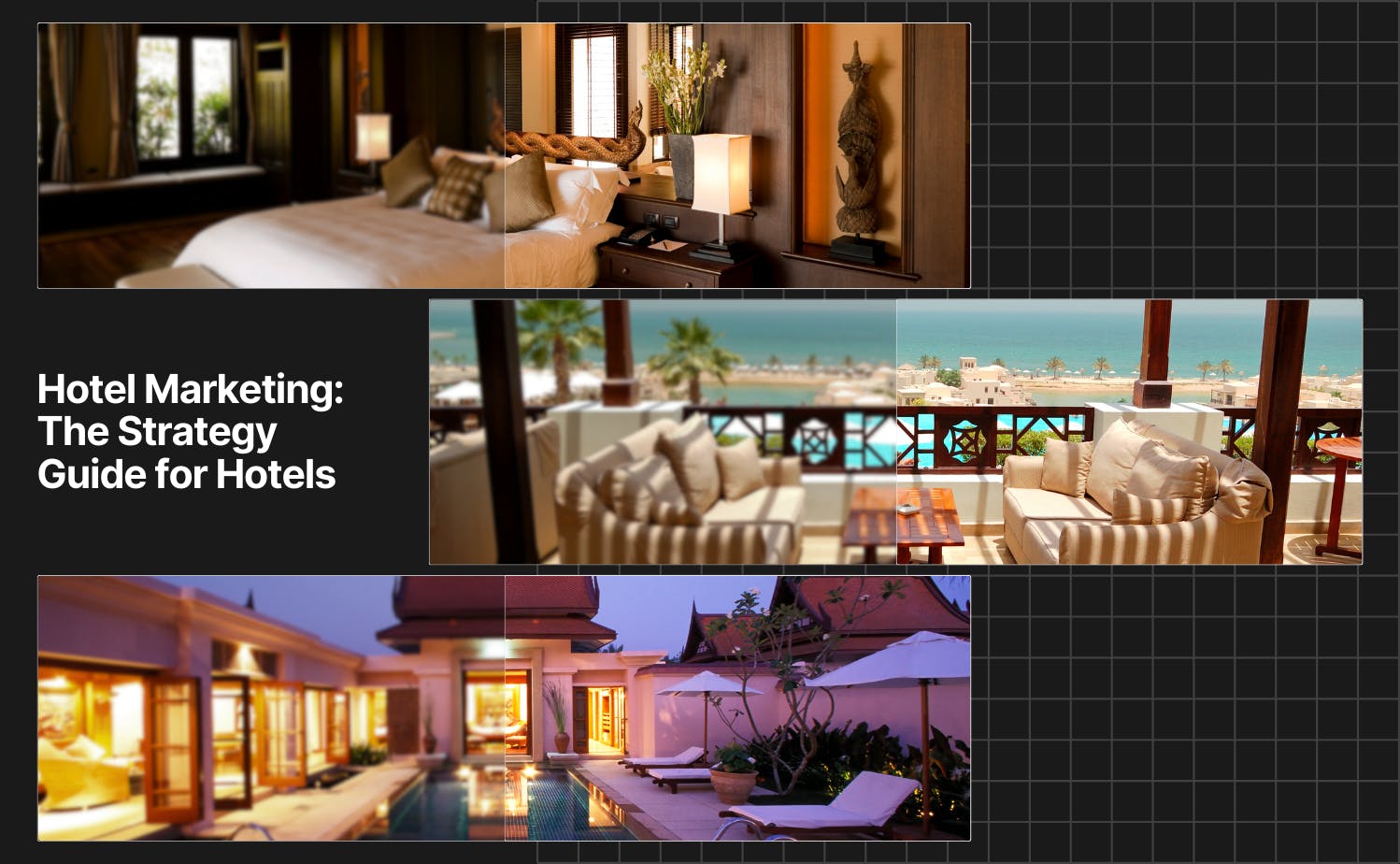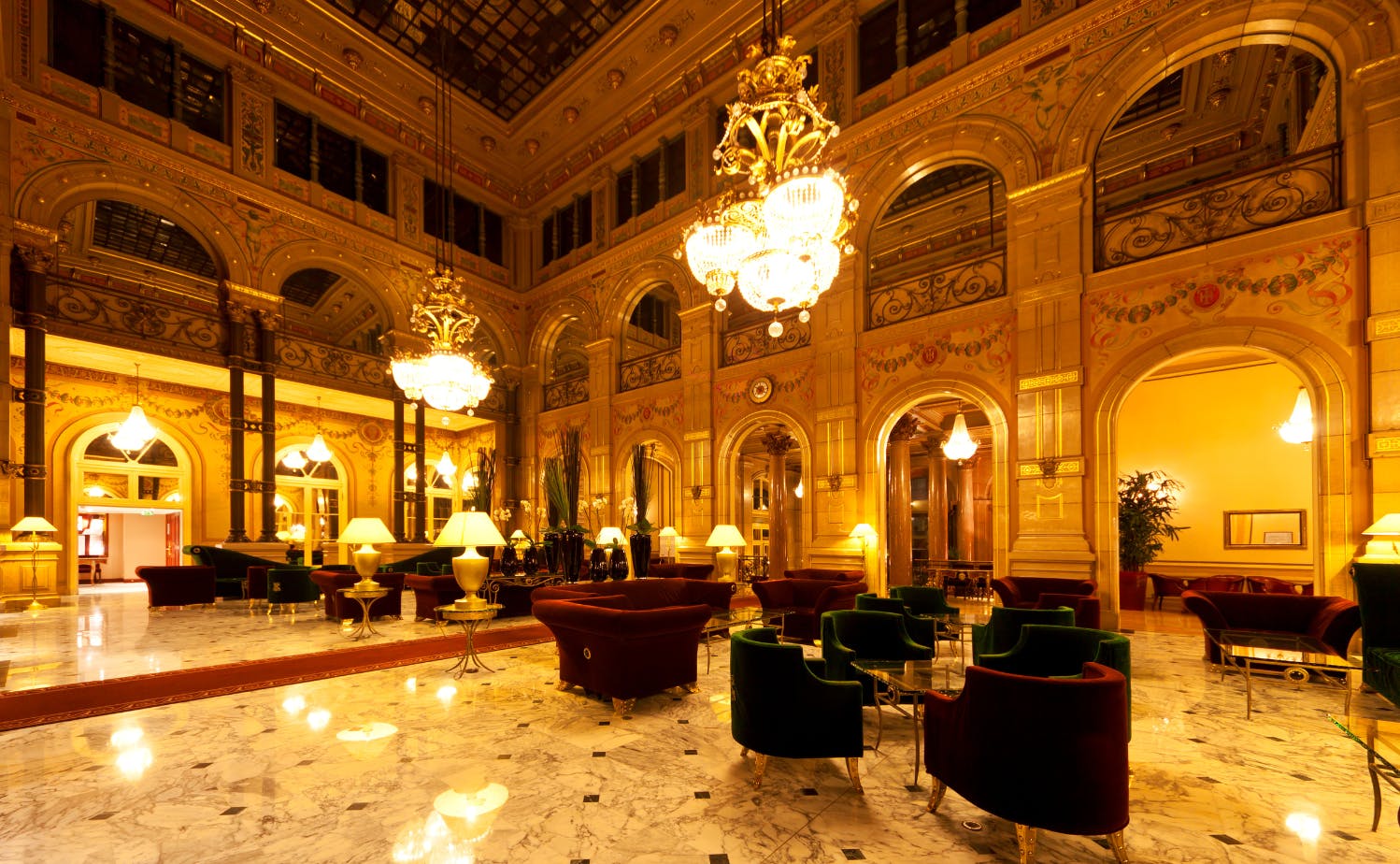
Hotel Marketing: The Marketing Strategy Guide for Hotels

Introduction
In the highly competitive world of hospitality, effective hotel marketing is essential to standing out in a crowded marketplace. Hotel groups face unique challenges, as they need to manage and promote multiple properties while maintaining brand cohesion and delivering consistent, high-quality guest experiences. This guide will provide you with the best strategies for attracting guests, building loyalty, increasing direct bookings, and optimizing digital channels. Covering everything from SEO and content marketing to social media and partnerships, this article will help hotel groups navigate the complexities of the industry and maximize their hotel marketing potential.
1. Setting the Foundation: Define Your Brand Message and Target Market
A well-defined brand identity and target market are foundational to every successful hotel marketing strategy. The first step is to understand who your guests are and why they would choose your properties over competitors.
Crafting a Unique Brand Identity
Your brand is more than a logo; it’s a promise to your guests. Develop a unique and cohesive brand identity that communicates what makes your hotel group stand out, such as luxury, sustainability, or exceptional service. For instance, if your hotels focus on eco-conscious travelers, highlight green initiatives like water conservation, energy efficiency, and partnerships with local artisans. Let every aspect of your branding—from the website and social media to physical property decor—reflect this identity.
Segmenting the Audience for Targeted Marketing
Define the different types of travelers who would be interested in your properties. Common segments include business travelers, families, luxury seekers, eco-conscious travelers, and adventure tourists. For each persona, outline their preferences, typical booking behavior, and motivations. For example, business travelers may value high-speed Wi-Fi and on-site meeting spaces, while families may look for child-friendly amenities and local attractions.
Aligning Brand and Audience for Success
Each property should maintain its own identity while also aligning with the overall brand of the group. If your brand has multiple properties in different market segments, this allows each hotel to attract a unique segment while maintaining a consistent brand promise. A resort focused on family vacations should emphasize kid-friendly activities and family packages, while a business-oriented hotel in an urban area should highlight meeting spaces, work-friendly amenities, and proximity to business districts.
Example Action Step: Create detailed profiles for your primary guest personas. Include information on age, location, preferences, booking behavior, and unique needs. Use these profiles to guide marketing materials across different channels, allowing for more personalized and impactful campaigns.
2. Building a Robust Digital Presence
A hotel group’s digital presence is often the first touchpoint for potential guests, making it essential to create an optimized, user-friendly online experience that ranks well in search engines and converts visitors into bookings.
Designing a User-Friendly, SEO-Optimized Website
A website that is not only visually appealing but also optimized for SEO and conversions is key to attracting guests in a competitive digital landscape.
User Experience (UX) as a Conversion Driver
A hotel website should be mobile-responsive, fast-loading, and easy to navigate. This includes having clear, intuitive paths for users to find information, browse rooms, view amenities, and make bookings. Display high-quality images of rooms, amenities, and nearby attractions to help guests visualize their stay. Ensure the booking process is seamless by minimizing steps and offering real-time availability.
SEO Fundamentals for Visibility
Use keyword-rich titles, meta descriptions, and header tags. Conduct keyword research to identify both general and location-specific terms that potential guests might use, such as “luxury hotel in Paris” or “family-friendly hotel near Central Park.” Include these keywords in your website’s content, blog, and descriptions to improve your search engine rankings.
Conversion-Optimized Booking Engine
A good booking engine is user-friendly, with minimal steps to complete a reservation. Consider integrating upselling options like room upgrades, add-ons (such as spa packages), and extra amenities to boost revenue per booking.
Additional Tip: Offer a multilingual website experience if your properties cater to international travelers. This not only enhances accessibility but also increases conversion rates by allowing guests to browse and book in their preferred language.
Content Marketing to Educate, Engage, and Rank
High-quality content is crucial for SEO, guest engagement, and positioning your brand as a helpful resource for potential travelers.
Educational Blog Posts to Attract Traffic
Creating blog content that addresses your audience’s interests can significantly improve your organic traffic. Focus on travel guides, local tips, hotel news, and experience-based content. For example, a blog titled “Top 10 Attractions Near [Hotel]” not only provides value but also aligns with search queries of travelers researching the area.
Video Content and Virtual Tours
Video is one of the most engaging forms of content and can effectively showcase the unique features of your properties. A virtual tour of the hotel rooms, amenities, and surrounding area can create an immersive experience, helping potential guests visualize their stay. Share this content across multiple channels, including your website, social media, and YouTube.
Social Proof and Guest Stories
Sharing positive reviews and guest testimonials builds trust with potential customers. Encourage guests to share their stories and experiences with your hotel. User-generated content can be showcased on the website, blog, and social media channels to attract new guests and increase credibility.
Example Action Step: Develop a content calendar with at least one blog post and one video per month. Rotate between topics related to hotel experiences, local attractions, and travel tips. Regular, fresh content can keep your site ranking well and engaging new visitors.

3. Leveraging Social Media for Brand Awareness and Engagement
Social media platforms offer a powerful way to connect with travelers, build brand loyalty, and drive direct bookings through engaging content and strategic advertising.
Platform-Specific Strategies
Each social media platform serves a different purpose and attracts a unique audience. Instagram is great for visual storytelling, allowing hotel groups to post images and short videos that capture the ambiance of the property and local attractions. Facebook provides versatility for sharing news, events, and engaging content, while LinkedIn is useful for connecting with corporate clients and business travelers.
Content Strategy for Engagement
Your social media content should be a mix of high-quality photos, videos, behind-the-scenes glimpses, user-generated content, and posts showcasing unique experiences. A well-balanced content strategy includes destination tips, event highlights, and guest stories, all aimed at keeping followers engaged and growing the community.
Influencer Marketing
Partner with travel influencers who have audiences that align with your target market. Influencers can increase brand visibility, credibility, and social reach. For example, an influencer can showcase their stay experience through an Instagram story takeover, sharing live experiences at your property.
Example Action Step: Create an Instagram-specific hashtag for your hotel group and encourage guests to use it. Consider running a monthly photo contest, rewarding the best guest photo tagged with the hashtag with a prize, such as a discounted or complimentary stay. This encourages engagement and generates a constant flow of user-generated content.
4. Prioritizing Reputation Management and Guest Reviews
In hospitality, reputation can make or break a property. Managing reviews, responding promptly to feedback, and showcasing positive guest experiences is crucial for maintaining a positive online presence.
Encouraging Guest Reviews
To ensure a steady flow of reviews, ask guests for feedback via automated post-stay emails. Make it easy for them to leave reviews by providing links to popular review platforms like Google, TripAdvisor, and OTA review sections. More positive reviews can improve your ranking on OTAs, attracting more guests organically.
Effective Review Management
Responding to reviews—both positive and negative—shows guests that your hotel group values their feedback. Thank guests for positive reviews and address negative reviews with empathy and a willingness to resolve any issues. This approach can turn dissatisfied guests into returning customers.
Highlighting Social Proof Across Channels
Display positive guest reviews on your website, social media, and even in physical locations like the lobby. Social proof is a powerful motivator and reassures potential guests that they’ll enjoy a quality experience at your hotel.
Example Action Step: Implement a “Review Us” reminder on checkout screens, in post-stay emails, and on printed materials like room key cards. Encourage guests to share their feedback while their stay experience is fresh.
5. Optimizing Listings for Maximum Conversion on OTAs
Optimizing your hotel listings on OTAs is essential to increase visibility and conversions. High-quality listings make properties stand out and attract guests ready to book.
High-Quality Photos
Photos are the first impression for many travelers. That’s why good photos can increase your conversion rate by 30%. Use professionally shot, high-resolution images that showcase rooms, amenities, and common areas from multiple angles. Prioritize visually striking photos first and aim for at least 20 images. AI moderation software can ensure your images meet your requirements across all platforms.
Compelling Titles and Descriptions
A well-crafted title grabs attention and highlights key features, such as “City Center Hotel with Rooftop Pool” or “Family-Friendly Beach Resort with Free Breakfast.” Descriptions should be concise, emphasize unique selling points, and use popular search terms (e.g., “business-friendly,” “free breakfast”). Bullet points can also help guests quickly scan for important amenities.
Accurate Amenity Listings
Make sure your amenities are up-to-date. Include everything from in-room conveniences to property features like gyms, pools, and pet-friendly services. Amenities like free Wi-Fi, parking, or breakfast can influence booking decisions.
Competitive Pricing
Regularly monitor competitor rates and use dynamic pricing to adjust for demand. Offering limited-time discounts, like mobile-only or last-minute deals, can help capture price-sensitive guests and improve rankings.
Utilize OTA Tools and Programs
Many OTAs offer options for boosting visibility, such as paid promotions or joining a “Preferred Partner” program. These programs can increase exposure, particularly during low-demand periods.
By optimizing your listings across these areas, you improve your property’s appeal and boost your visibility on OTA platforms, leading to higher conversion rates and more direct engagement with potential guests.

6. Maximizing Direct Bookings
While OTAs are beneficial for exposure, focusing on direct bookings helps increase profit margins, reduce commission fees, and foster guest loyalty.
Direct Booking Incentives
Offer special perks for guests who book directly through your website. Examples include free Wi-Fi, complimentary breakfast, or room upgrades. Make sure to highlight these perks on your website, in email campaigns, and across social media to reinforce the value of booking direct.
Loyalty Programs to Reward Repeat Guests
A well-designed loyalty program encourages repeat bookings by rewarding guests with points or exclusive discounts. Some hotels even offer exclusive benefits to loyalty members, such as access to VIP lounges or early check-in and late checkout options.
CRM-Driven Personalized Email Campaigns
Use customer relationship management (CRM) data to segment your guest database and send personalized email campaigns. For instance, send exclusive offers to past guests for upcoming holiday seasons or special events, reminding them of the benefits of booking directly.
Example Action Step: Add a “Book Direct” banner to the homepage of your website that lists all the exclusive benefits of booking directly. Place the banner in a highly visible area to maximize conversions.
7. Utilizing Paid Advertising and Retargeting
Paid advertising allows hotel groups to target specific audiences effectively, and retargeting can capture potential guests who visited your website but didn’t complete their bookings.
Google Ads and Metasearch Marketing
Google Ads and metasearch sites allow you to capture demand from travelers actively searching for accommodations. Google Ads is effective for targeting high-intent travelers, while metasearch platforms help potential guests compare room rates across OTAs and your direct booking site.
Social Media Advertising
Facebook and Instagram ads are effective ways to target potential guests based on location, travel preferences, and demographics. You can also use retargeting ads to reach visitors who viewed your website but didn’t make a booking, keeping your hotel top of mind as they continue to browse.
Retargeting to Re-engage Visitors
Retargeting campaigns can re-engage potential guests by reminding them of their previous interest. Use dynamic retargeting ads that display the specific rooms, offers, or packages that visitors viewed. Offering an incentive like a small discount can be the nudge they need to book directly.
Example Action Step: Set up a retargeting campaign on Facebook targeting visitors who viewed rooms or amenities but didn’t book. Include a “limited-time offer” discount to create urgency and encourage immediate bookings.
8. Embracing Data-Driven Marketing and Analytics
Data analytics enables hotel groups to track and optimize marketing efforts, guest behaviors, and campaign performance, allowing for continuous improvement.
Google Analytics for Website Insights
Regularly monitor website analytics to understand visitor behavior, including pages viewed, conversion rates, and traffic sources. Use these insights to identify areas for improvement, such as enhancing user experience on high-bounce-rate pages.
A/B Testing for Optimal Conversions
Use A/B testing to experiment with different landing pages, calls-to-action, and email marketing strategies. For example, test different versions of a booking page to see which one has the highest conversion rate, or try two subject lines to determine which has a better open rate.
Revenue Management Data for Pricing Optimization
Leverage data from your property management system (PMS) to make informed pricing decisions. Monitor demand patterns, competitor rates, and seasonal trends, and adjust your pricing and promotions accordingly to maximize occupancy and revenue.
Example Action Step: Set up monthly or quarterly reports to track key performance indicators (KPIs) like website traffic, social media engagement, and conversion rates. Regularly analyze this data to adjust strategies as needed.
Optimizing your Hotel Marketing to Drive More Bookings
Effective hotel marketing for hotel groups requires a multifaceted approach that leverages digital marketing, guest engagement, reputation management, and personalized experiences. By building a strong brand identity, optimizing online channels, prioritizing guest feedback, and staying data-driven, hotel groups can attract more guests, increase direct bookings, and maintain a competitive edge in the industry.
With a 360° solution like OCUS, you can seamlessly deploy professional photographers to any of your global locations. Then, our AI-powered software automatically audits images across all your hotel listings. In this way, you can keep an eye on every image being published and assess its quality and brand-alignment to ensure that your group publishes only visuals that are consistent and compelling across all platforms.